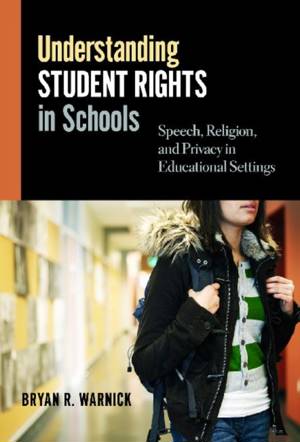
- Retrait gratuit dans votre magasin Club
- 7.000.000 titres dans notre catalogue
- Payer en toute sécurité
- Toujours un magasin près de chez vous
- Retrait gratuit dans votre magasin Club
- 7.000.0000 titres dans notre catalogue
- Payer en toute sécurité
- Toujours un magasin près de chez vous
Understanding Student Rights in Schools
Speech, Religion, and Privacy in Educational Settings
Bryan R WarnickDescription
What rights should students expect to exercise in public schools? Should Bible study meetings be allowed during free periods? Should students be allowed to wear T-shirts that exhort taking drugs or committing violent acts? Should students be required to participate in drug testing? In this concisely argued book, Bryan Warnick examines how student rights in three areas--free speech, privacy, and religious expression--have been addressed in policy, ethics, and the law.
Starting with the Tinker decision, a landmark 1969 U.S. Supreme Court ruling which declared that students in public schools had constitutional rights that must be understood "in light of special characteristics of the school environment," Warnick develops education criteria that schools can use when facing difficult questions of student rights. Both probing and practical, Warnick explains how student rights can be properly understood and protected.
Important reading for anyone concerned with the ethical dimensions of schooling, this book offers:
- A comprehensive analysis of the relationship between ethics and law in school settings.
- A specific framework for thinking about individual rights for students in public schools which balances authentic respect for individual liberties with the real need for schools to maintain a proper learning environment.
- An interdisciplinary approach that looks at legal, philosophical, and psychological issues in education.
- Practical solutions to real and pressing ethical challenges faced by today's educators, school leaders, and policymakers.
Spécifications
Parties prenantes
- Auteur(s) :
- Editeur:
Contenu
- Nombre de pages :
- 208
- Langue:
- Anglais
Caractéristiques
- EAN:
- 9780807753798
- Date de parution :
- 23-12-12
- Format:
- Livre broché
- Format numérique:
- Trade paperback (VS)
- Dimensions :
- 162 mm x 229 mm
- Poids :
- 308 g

Les avis
Nous publions uniquement les avis qui respectent les conditions requises. Consultez nos conditions pour les avis.






